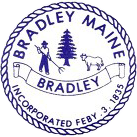Revaluation Q&A
Revaluation Questions and Answers
What is a revaluation?
A revaluation is the process of conducting the data collection and market analysis necessary to equalize the values of all properties within a municipality for a fair distribution of the tax burden.
Why is a revaluation needed?
For the past several years the Town of Bradley has been experiencing tremendous growth and the real estate market has been thriving. Since property taxes, which pay for municipal services such as schools, fire & rescue, county services, waste disposal, road repairs, and snow removal, are based on market value; and because the market is constantly changing, it is essential that property values are kept current. Maine State law requires that cities and towns perform a revaluation whenever the ratio of assessment to sales price drops below 70 percent or the quality of assessments erodes. Before the revaluation, the Town of Bradley was declared at 69%. It is a legal requirement that all properties are assessed as close as possible to current market value to create an equitable distribution of the total tax burden.
What is market value and who determines my property value?
Market value is determined by the activity in the real estate market and the general economy. The value of your property is based on an analysis of the entire market for the full two calendar years before the completion of the revaluation project.
It is the Assessing Agent’s job to research and analyze the values in any particular area or neighborhood. In effect, he or she does what you would do to determine the selling price when putting your property up for sale. Examples of factors that are examined for each property are location, size, quality of construction, age of improvements, topography, utilities, and zoning restrictions.
Will a revaluation increase taxes?
A revaluation may result in an increase or decrease in individual assessments. Assessed values are the base that is used to apportion the tax burden. The tax burden is the amount that the municipality must raise from property taxes to operate the local government and schools and to support the many services each of us has come to expect. Assessed values will most likely go up, but the tax rate will most likely go down. As a result, property owners may only experience a moderate increase in taxes or even a decrease.
Who conducted the revaluation?
The Bradley Town Council hired an Assessing Agent to perform the revaluation. This Assessing Agent has completed a revaluation for the Town in 1990 and 2009.
How does revaluation benefit property owners?
Property taxes are based on property values. Without periodic revaluations, some property owners would pay relatively more while others would pay relatively less. Revaluation resets property values to their current market values so that the property tax burden is equitable for all taxpayers.
In addition, when the ratio of assessment to sales price is 100%, the taxpayers receive the full amount of their exemption values. Banks often call and request assessed values on properties, these amounts can be used for financing purposes.
How will I know if my assessment is equitable?
There are two very good methods of determining this. First, compare your property to similar properties that were sold in the previous year. Your value should be in line with these sale prices. Second, if no recent sales are available, compare your assessment to other similar properties in your area using listings that are available in the municipal office or by reviewing the real estate commitment book available on townofbradley.net.
Your value should be in line with these similar properties. Remember, very few properties are exactly alike. Your value should be comparable, but it seldom will be exactly the same as what seems to be a similar property.
If I disagree with my assessment, what are my options?
By State law, if a property owner believes the final assessment on their property is in excess of its fair market value, he or she will need to contact the Assessing Agent within 185 days of the date of Commitment to request an abatement of taxes. The Assessing Agent will make a determination and provide it to the Town Council for approval. If not satisfied with the Assessor’s determination, the property owner may also ask the Town Council to review the abatement. If the property owner is not satisfied with either of those options, they can appeal to the Penobscot County Board of Assessment Review. The Board will review the case and determine the disposition of the appeal. After that, should the property owner still feel the assessment is incorrect; an appeal can be made to the Maine Superior Court and even to the Supreme Court. In the case of large commercial properties, the case will be heard by the State Board of Assessment Review before going to Superior Court.
Are there any tax relief measures available?
Yes! Tax relief programs are Veteran’s Exemption, Homestead Exemption, Tree Growth tax program, Farm and Open Space tax program, the Maine State Property Tax Deferral Program, the Maine Business Equipment Tax Reimbursement Program (BETR), and the Business Equipment Tax Exemption Program (BETE). Information regarding these programs can be found on the assessing page of townofbradley.net.
Who should I contact if I have more questions?
Please contact Town Manager Melissa Doane at 207-827-7725 or email at mldoane@townofbradley.net
